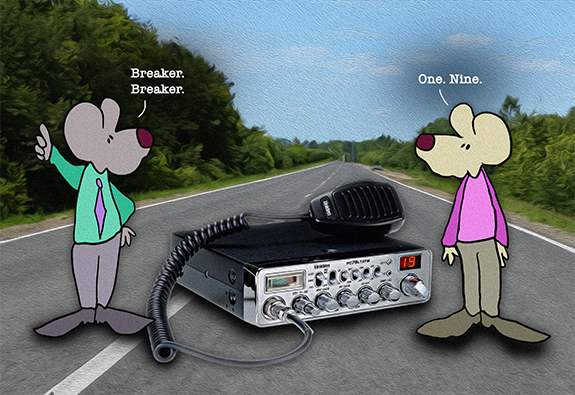Well. Today’s entry didn’t actually happen on this date. But it is about this date, October 4th. Also known as 10-4.
That’s a 10-4, good buddy. Ten-four.
Yes. I’ve said this catchy phrase before in my lifetime, not always knowing what it meant. When I was a kid, one of my friend’s dad had a CB radio. And every so often, we’d break the rules and get on that radio, acting like we were somebody. And then we’d jabber up the CB airways like a couple of little fools.
And that is one of the phrases we said. 10-4. It is one of the ten-codes, or radio signals, invented by the Association of Public-Safety Communications Officials-International (APCO). 10-4 is an affirmative signal. It meant, and still means, “OK.”
The ten-codes are credited to Illinois State Police Communications Director Charles Hopper, who created them between 1937–40 for use in radio communications among cops. A long time ago. You see, back in the 1930s, radio technology was still relatively new and meager. For one thing, there were limited police radio channels. So all of those good law-keeping officers couldn’t stay on the line too long, or else others wouldn’t be able to get through.
That is when Mr. Hopper put on his thinking cap. His scheme of “ten-codes” was invented to communicate information quickly and clearly.
Also, of note, back then. Radios were a little on the wonky side. So. The use of the number 10 before all of the codes was another workaround. When I say “wonky,” I mean that it took a split second for the motor-generator in the radios to warm up. Because of this, the first syllables of a radio transmission were often lost. So, the 10 was used as a placeholder to give the motor-generator time to speed up enough to hear the second part of the code.
And then, of course, these handy codes were quickly adopted by others communicating via radio, such as CB (Citizen Band) radio enthusiasts and truckers. And little kids, jerking around when they shouldn’t have been.
These codes became very popular during the 1950s. Mostly because of a TV crime drama, called Highway Patrol. It starred starring Broderick Crawford, known for starting his conversations on his radio with 10-4. Oh, those 1950s TV shows. You got to love some of them.
Anyway, those ten-codes have mostly been replaced by plain language in more and more police departments due to variations in what the codes mean. Truckers and other CB radio users still use them, though.
Some others? 10-74 Prison/Jail Break. 10-49 Drag Racing. 10-44 Riot.
Or. 10-22. Which is “disregard.” And you can 10-22 this whole thing if you’d like.
In all fairness, though. I said that in the month of October I would find one historical “fact” for each day of the month.
So sadly, I bring you this one.
It was on this date, October 4, 1989 that Secretariat died, at the age of 19.
Oh, how I loved Secretariat. There is no other horse like him.
He is definitely one of the most famous racehorses of all time. Secretariat was sired by Bold Ruler. His mom was Somethingroyal.
Secretariat’s wins included the 1972 Kentucky Derby, the Preakness Stakes, and the Belmont Stakes, becoming the first horse since Citation in 1948 to win the Triple Crown. He set racing records in all three races.
His time in the Kentucky Derby still stands as the Churchill Downs track record, and his Belmont time is the American record for one-and-a-half miles on dirt.
Secretariat retired to stud at Claiborne Farm in Paris, Kentucky, where he eventually became the leading sire in North America for several years.
Coincidentally, the year Secretariat was winning all those races was the same year when I was slobbering on the microphone of that CB radio. He always wore his three distinctive white “socks.” I, too, always wore three white socks. One on my right foot, two on my left.
And that, my friends, is all history.
“”””””””””””””””””
The limits of my language means the limits of my world.
— Ludwig Wittgenstein
“”””””””””””””””””
A different language is a different vision of life.
— Federico Fellini
“”””””””””””””””””
Language exerts hidden power, like the moon on the tides.
— Rita Mae Brown
“”””””””””””””””””
Fast ways to say things. And fast horses.
